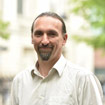RCSI is ranked in the Top 50 in the Times Higher World University 2022 for 'International Outlook'. Our global outlook is underpinned by collaborative partnerships with institutions across the world. Here, Dr Tobias Engel shares his perspectives on the value of international collaboration to his research.
I moved to Ireland in 2005 for a postdoctoral role having completed my PhD in Madrid. I had stayed in contact with my PhD supervisor along with a number of other former lab colleagues and in 2010 we made the decision to collaborate in the field of purinergic signalling and epilepsy. We were successful in securing a Horizon 2020 grant after the publication of our first paper and that funding allowed us to start putting together a consortium on purinergic signalling.
The consortium is now made up of former colleagues and collaborators across Europe as well as new collaborators I met while working here in Ireland, including industry partners, clinicians who support our biomarker studies, and other academics.
We have found that by blocking a specific receptor we not only suppress epileptic seizures, which are refractory to current medication, but that these effects seem to stay-on suggesting some sort of disease modification. We have also shown in patients that blood purines change when someone has a seizure or has epilepsy and we are in now in the very exciting phase of developing point of care devices with industry partners for patients with epilepsy.
The exchange of ideas
Collaboration makes everything much more interesting. The opportunity to travel to different labs and exchange ideas and insights with a range of different people leads to much more impactful and fulfilling work.
New ideas emerge when you meet lots of new people with exciting research and I have been able to apply things to my research which would have been outside of my reach. For example we used biosensors to pick up specific molecules in the blood for epilepsy diagnosis. That work has been published and we are now developing a new point of care device for epilepsy diagnostics.
One of the greatest benefits in my experience is the access that’s possible through a consortium to techniques and resources such as new sensors for testing biomarkers in patients with epilepsy.
We have had more grant success and several publications because of this collaboration, with funding now coming from Marie Curie fellowships, the Health Research Board and Science Foundation Ireland.
Investing time in remaining connected with your collaborators is key to your success, in my opinion. The pandemic has, of course, made that more challenging, but you have to find ways to overcome that.
I think it is also important to distinguish between 'functioning' collaborations and one-way collaborations. You must be able to tell the difference and only continue with collaborations that are of mutual interest and benefit. Be mindful too of not overdoing it. People will not want to work with you if a project becomes unmanageable.
A solid track record in your field helps you to establish collaborations with good labs and making sure you deliver on what you have promised is absolutely critical.
Read more about Dr Engel's research on epilepsy.
 Dr Tobias Engel is a Senior Lecturer in Physiology and Medical Physics at RCSI and coordinator of European consortium PurinesDX. Dr Engel’s research focus is a study of pathological changes which occur after brain damage and which lead to the development of epileptic seizures.
Dr Tobias Engel is a Senior Lecturer in Physiology and Medical Physics at RCSI and coordinator of European consortium PurinesDX. Dr Engel’s research focus is a study of pathological changes which occur after brain damage and which lead to the development of epileptic seizures.
RCSI is committed to achieving a better and more sustainable future through the UN Sustainable Development Goals.
